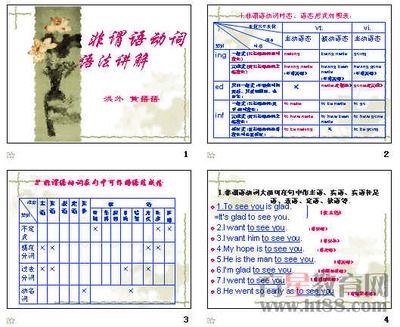初中被动语态语法讲解
(一) 语 态分 类
英语动词有两种语态.,主动语态和被动语态。主动语态表示主语是动作的执行者,被动语态表示主语是动作的承受者。如:
They willbuild a new bridge over the river. (主动)
A new bridge will be built over theriver. (被动)
汉语中常用“被”、“给”、“由”、“受”等词用来表示被动,而英语用:
助动词be + 及物动词的过去分词构成。
(二)被动语态的时态、人称和数的变化
主要体现在be的变化上,其形式与系动词be的变化形式完全一样。以 give为例,列表如下:
一般现在时:am / is / are + done
一般过去时:was / were + done
一般将来时:shall / will + be done
一般过去将来时:should / would + be done
现在进行时:am / is / are + being + done
过去进行时:was / were + being + done
现在完成时:have / has + been + done
过去完成时:had + been + done
将来完成时:shall / will +have been + done
过去将来完成时:should / would + have been +done
[注]被动语态没有将来进行时和过去将来进行时。
(三)常见的八种时态中的被动语态
1. 一般现在时:
(1)People grow rice in the south of thecountry.
Rice is grown in thesouth of the country.
(2)The school doesn't allow us to enterthe chemistry lab without a teacher.
We are not allowed toenter the chemistry lab without a teacher.
2. 一般过去时:
(1)They agreed on the building of a newcar factory last month.
The building of a new car factorywas agreed on last month.
(2)The students didn't forget hislessons easily.
His lessons were noteasily forgotten
3. 一般将来时:
(1)They will send cars abroad bysea.
Cars will be sent abroadby sea.
(2)They will give plenty of jobs toschool-leavers.
Plenty of jobs will begiven to school-leavers.
4. 过去将来时:
(1)The manager said they would completethe project by the end of the year.
The manager said the projectwould be completed by the end of the year.
(2) The workers told me they would mendthe car as soon as possible.
The workers told me that the carwould be mended as soon as possible.
5. 现在进行时:
(1)The radio is broadcasting Englishlessons.
English lessons are beingbroadcasted on the radio.
(2) We are painting the rooms.
The rooms are beingpainted.
6. 过去进行时:
(1)The workers were mending theroad.
The road was beingmended.
(2)This time last year we were plantingtrees here.
Trees were being plantedhere this time last year.
7. 现在完成时:
(1)Someone has told me the sportsmeeting might be put off.
I have been told thesports meeting might be put off.
(2)He has brought his book here.
His book has been broughthere.
8. 过去完成时:
(1)When I got to the theatre, I foundthey had already sold out the tickets.
When I got to the theatre, I foundthe tickets had already been soldout.
(2) The whole country was very sad atthe news of his death; People had considered him to be agreat leader.
He had been considered to be a great leader
(四)含有情态动词的被动语态:
含有情态动词的被动语态是由“情态动词+ be+及物动词的过去分词”构成。
(1)Youmust hand in your compositions after class.
Your compositions must be handedin after class.
(2)He can write a great manyletters with the computer.
A great many letters can bewritten with the computer by him.
(五) 被 动语 态 的 使 用
1.当不知道或没有必要指出动作的执行者时,常用被动语态,这时往往不用by 短语。
“Mr. White,the cup was broken after class. ”
2.突出或强调动作的承受者,如果需要说出动作的执行者,用by 短语。
These recordswere made by John Denver.
The cup was broken by Paul.
3.当汉语句子的主语既不是动作的执行者,也不是动作的承受者时,这时常用in + 名词作状语,而代替by 短语。
These carswere made in China.
(六)主动语态变被动语态的方法
(1) My auntinvitedmeto her dinner party.
主语谓语 宾语
→Iwasinvited (by my aunt ) to her dinnerparty.
主语谓语宾语
(2) The school set up a specialclass to help poor readers.
→ Aspecial class to help poor readers was set up in theschool.
1.把主动语态的宾语变成被动语态的主语。
2.把主动语态的谓语变成被动语态的be +过去分词,时态要与原句保持一致。
3.把主动语态的主语变为介词by的宾语,放在被动语态里谓语动词之后,by 短语可以省略。如果原句主语是地点名词,在被动语态中用in +地点名词作状语。
(七)语态转换时所注意的问题
1.把主动语态变为被动语态时,其谓语动词的时态要与原句时态保持一致,其谓语动词的数要与新主语保持一致。
We have bought a newcomputer.
A new computer has beenbought. (正确)
A new computer have beenbought. (错误)
2.含有双宾语的主动句变被动句时,可分别将其中的一个宾语变为主语,另一个不动,一般变间接宾语为主语时比较多。
My uncle gave me a presenton my birthday.
I was given a present on mybirthday.
如果把直接宾语(指物)改为主语,则在间接宾语(指人)前加适当的介词,如上句还可以说:
A present wasgiven to me yesterday.
注意:1.一般在下列动词后,常在间接宾语前用介词 to,如:
bring, give, hand, lend, offer, pass, pay, promise, sell, show,take, teach, tell 等。
(1) The book was showed to the class.
(2) My bike was lent to her.
2.一般在下列动词后,间接宾语前用介词 for, 如:
![[转载]初中被动语态语法讲解 初中被动语态讲解](http://img.aihuau.com/images/02111102/02123328t01b58978720f796b40.jpg)
build,buy, cook, cut, choose, do, fetch, find, fix, get, keep, make,order, paint, play, sing 等。
(1) A new skirt was made for me.
(2) The meat was cooked for us.
(3) Some country music was played forus.
3. 由动词+介词或副词构成的短语动词,要把它们作为整体看,即把它们看成一个及物动词,介词或副词不可拆开或漏掉。这类动词有:
不及物动词+ 介词,如: agree to, askfor, laugh at, operated on, listen to, look after, think of, talkabout 等。
The patientis being operated on.
The problem is solved. It needn't betalked about.
及物动词+ 副词:如:bring about, carryout, find out, give up, hand in, make out, pass on, point out, putaway, put off, think over, turn down, work out, turn out等。
His request was turneddown.
The sports meet will be put off becauseof the bad weather
4. 带复合宾语(宾语+宾补)的动词改为被动语态时,一般把主动结构中的宾语改为主语,而宾语补足语保留在谓语动词后面。如:
(1)We always keep the classroom clean.
→The classroom is always keptclean.
(2) She told us to follow herinstructions.
→We were told to follow herinstructions.
注意:在see, watch, hear, notice, listento, look at, make, feel等动词后作宾语补足语的动词不定式都不带to,但改成被动语态后都带to,这时不定式为主语补足语,也就是说不定式作主语补足语不存在省略to的问题。
Weoften hear him play the guitar.
→He is often heard to play theguitar.
5. 当主动句的主语是nobody, noone等含有否定意义的不定代词时,被动句中将其变为anybody,作by的宾语,并将谓语动词变为否定的被动语态。如:
Nobody can answer this question.
误:The question can be answered bynobody.
正:The question can not be answered byanybody.
6. 当否定句中的宾语是anything,anybody, anyone等不定代词时,在被动句中应将其分别变为nothing, nobody, noone作主语,并将谓语动词变为肯定的被动语态。如:
They haven't done anything to make the riverclean.
误:Anything hasn't been done to make theriver clean.
正:Nothing has been done to make theriver clean.
7.以who为主语开头的疑问句,变被动时,用by whom放在句首:
Who wrote the story?
误:Who was the story written?
正:By whom was the story written?
8. 有些动词既是及物又是不及物,当它们和well,badly,easily等副词连用时,表示主语内在品质或性能,是不及物动词,用主动表示被动,这时不用被动语态,常见的有:write,read, clean, sell, wash, cook 等。如:
(1)The clothwashes easily. 这布很好洗。
(2)The new product sellswell. 这新产品很畅销。
对比:
The books sell well. (主动句)
The books were sold out. (被动句)
The meat didn’t cook well. (主动句)
The meat was cooked for a long time.(被动句)
9. 下列情况主动句不能改为被动句:
第一,感官系动词一般用主动形式表示被动意义,如:feel,look, seem, taste, sound,remain等。
(1)— Do you like thematerial? — Yes, it feels verysoft.
误:It is felt very soft.
(2)The food tastes delicious.
误:The food is tasted delicious.
(3)The pop music sounds beautiful.
误:The pop music is soundedbeautiful.
第二,谓语是及物动词leave, enter, reach, suit,have, benefit, lack, own等。如:
He enteredthe room and got his book.
误:The room was entered and his book wasgot.
She had her hand burned.
误:Her hand was had burned.
第三,一些不及物动词短语没有被动语态,如:take place,break out, belong to, lose heart, consist of, add upto等。如:
The fire broke out inthe capital building.
误:The fire was broke out in the capitalbuilding.
第四,不及物动词没有被动语态,如:rise, happen,succeed, remain, lie等。
When we got to the topof the mountain, the sun had already risen.
误:The sun had already been risen.
After the earthquake, few housesremained.
误:After the earthquake, few houses wereremained.
第五,宾语是反身代词,相互代词,同源宾语,不定式,v-ing形式及抽象名词等,不能变为被动句子的主语,如:
I taught myselfEnglish.
误:Myself was taught English.
We love each other.
误:Each other is loved.
10.在汉语中,有一类句子不出现主语,在英语中一般可用被动结构来表示,例如:
据说……It is said that …
据报导…… It isreported that …
据推测…… It issupposed that …
希望……It is hoped that …
众所周知……It is well known that …
普遍认为……It is generally considered that …
有人建议……It is suggested that …
1) It is reported that it is going torain tomorrow.
2) It is well known that Thomas Edisoninvented the electric lamp.
 爱华网
爱华网



